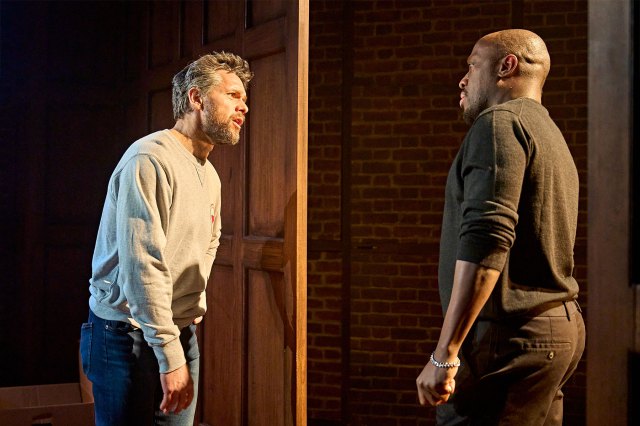Power of Sail at Menier Chocolate Factory – review
The European premiere production runs until 12 May

It’s not only the title of Paul Grellong’s new play that is a bit of a mystery. This drama, first seen in the US in 2019, takes a fascinating subject and then via various unlikely plot twists, so muddies the water that its impact is blunted.
The theme is freedom of speech and the plot begins when Julian Ovenden’s Harvard history professor Charles invites a notorious white supremacist Holocaust-denier to participate in a symposium he is organising on the subject of “American extremism”. As soon as news leaks, his office is surrounded by angry student protests, and both the Dean (Tanya Franks) and Baxter, a former student now rising academic star (Giles Terera), plead with him to reconsider. “You have to be discerning about who you ask to speak freely,” Baxter argues.
Charles seems puffed up by his own importance. “The answer to hate speech is more speech,” he insists, pompously and repeatedly. But as the action progresses, his motives for making this offer to a “Klansman with a 100-dollar haircut” are revealed as being far less clear-cut and more self-interested than at first appears.
At the same time, the narrative gets more and more clotted with different ambitions and personalities. Charles’s two graduate students – quiet, conciliatory Maggie and confident Lucas – also show unexpected sides to their characters. A shooting, an FBI agent who admires Charles’ first book, and a joke-telling barman are also thrown in for good measure.
Grellong further confuses things by using a circular time frame that turns the action back in time as it moves forward. It’s effective in creating the atmosphere of a thriller as each twist and turn is slowly uncovered, but it doesn’t allow the more serious side of the argument truly to develop. It ends up skating along the surface of a hugely important debate rather than digging deep and Baxter’s contention that tolerance only ever leads to the destruction of tolerance is under-explored.
Dominic Dromgoole’s direction keeps everything moving smoothly, with an elegant clarity and clear emphasis. It’s much helped by an adaptable set by Paul Farnsworth of wood-panelled walls which are moved to create a comfortable academic office, a dilapidated station and a local bar with equal ease.
The performances too sustain the interest, gliding over the improbabilities of the plot. Ovenden offers a convincingly charming figure, whose surface arrogance conceals deep insecurity and a sense that his moment has passed. His default position under attack is to crease his eyes into a smile that he hopes will deflect all criticism.
Terera impresses as Baxter, a rising star exuding charm and calm that both face a test when he’s confronted by bitter accusations and Katie Bernstein brings credibility and nuance to her brief scenes as the surprisingly steely Maggie.
Oh, and power of sail is a yachting term for the rule that means a mechanised boat has to give way to a sailboat. Quite what its relevance is here is obscure, but like the play itself, it’s an interesting footnote to the theatrical vocabulary.

















